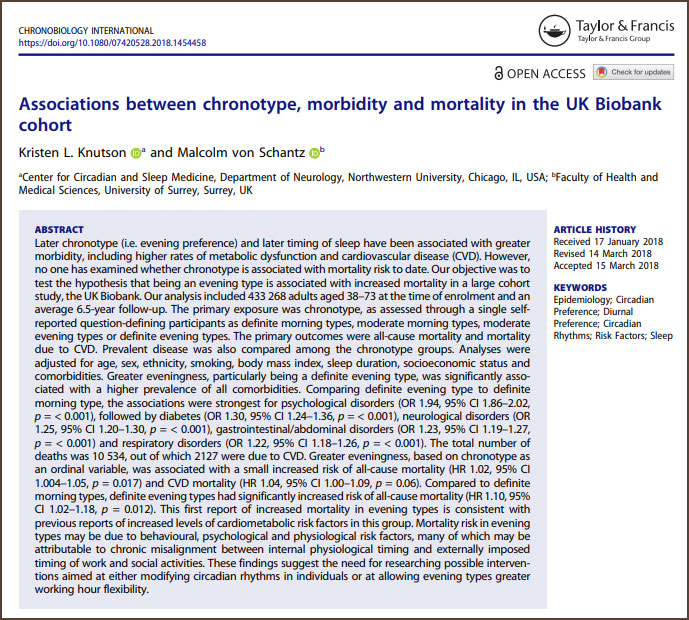
Is your time difference the same as everyone else's? Some people have been forced to become night owls* due to their occupations, but the number of people who prefer nocturnal activities has increased dramatically due to lifestyle and mental influences. But it's important to note that when you're active during the day and night, there can be red flags for your health.
Why nocturnal humans have a higher risk of death

Researchers from the University of Surrey in the UK and Northwestern University in Chicago published the results of a large-scale study in the international journal "Chronobiology International" in 2018.
Around 500,000 people aged 30 to 73 in the UK were followed for 6.5 years and found that nocturnal people had a 10% higher risk of dying within the study period than morning people. Studies have shown that nocturnal lifestyles are more likely to lead to health problems such as diabetes (33%↑), gastrointestinal disorders (23%↑), respiratory disorders (22%↑), neurological disorders (25%↑), hypertension and cardiovascular disease.

In other words, our bodies go through a tight schedule to keep up with the different reactions inside. For example, we usually eat right after waking up, so we produce the most insulin in the morning. To do this, the circadian system is ready to start our metabolism even before we take a bite of breakfast. It's much more efficient. But in nocturnal people, everything that the circadian controls is delayed and out of harmony.

Have you heard of the term social jet lag? It is a term that refers to when our biological clock is out of harmony with society. Think about your Monday morning. If you go to bed late on the weekend, you should wake up a few hours earlier. If you experience that every week, our circadian system is going to be stressful. Let's take a look at the results of the study.
A 2012 study in Science Translational Medicine showed that 24 healthy participants were given one hour of sleep each day to develop social jet lag for three weeks. At the end of the experiment, they began to show prediabetes. Even though there was no change in activity or food intake, I gained weight and my metabolic rate decreased by 8%. In other words, long-term fluctuations in the circadian system can have a negative impact on the body's metabolism.
A 2015 study in the Journal of Clinical Endoclinology and Metabolism showed that social jet lag was associated with insulin resistance, decreased HDL, increased triglycerides, and increased waist circumference in 447 middle-aged adults. However, this tendency remained the same even after lifestyle changes such as exercise, smoking cessation, and abstinence, suggesting how important it is for our health to work, sleep, and wake up on a biologically ideal schedule.
Dr. Knutson, a researcher who participated in the study, emphasized that nocturnal people's lifestyles are determined by genetic and environmental factors, but they can become morning people by their own volition and environmental factors.
The easiest thing to do is to control the light. As mentioned above, lie in bed in the dark. At this time, all electronic devices such as smartphones, TVs, tablets, and laptops should be turned off. And in the morning, you need to create an environment that allows you to be exposed to bright light.
The second is habit. Consistent your bedtime and waking up time every day. Only then can our circadian system recognize this. Staying up late on weekends also hinders the formation of consistent habits. Keep in mind that these two seemingly simple principles are very important for sleep hygiene and are the first step to becoming a morning person.
Recently, he said, "Everyone has different tendencies, but it's an old saying that you should go to bed early and get up early. Even if you go to bed late at night, you only need to get the same amount of sleep."There was an argument. However, the results of this study show that this is not the case. If you change your habits to a morning person and normalize your circadian system, you can reduce your risk of death by 10%, which will be more helpful than any other exercise or diet.





Comments (0)
There are no comments for this article. Be the first one to leave a message!